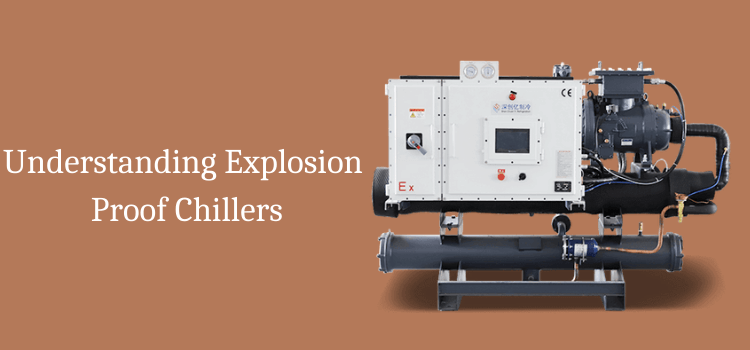Explosion-proof chillers are the ideal option for sectors that require chillers to function in hazardous environments. These tough cooling units may be found in a variety of locations, including petrochemical refineries and research facilities. However, the Cooling Water Chiller unit’s improved security isn’t limited to those fields. Knowing as much as you can about explosion-proof chillers might help you determine if one of these units is the best fit for your needs.

What Is an Explosion-Proof Chiller?
As a result of their strengthened construction, explosion-proof chillers safeguard the chiller’s components from ambient flammable elements that may trigger an explosion. There are no commercially produced chillers that are explosion-proof. The chiller must be built in accordance with strict rules in order to prevent it from catching fire.
The National Fire Protection Agency (NFPA), a fire safety organization, sets standards for explosion-proof equipment. The National Electrical Code (NEC) of the NFPA governs electrical regulations (NEC). This code outlines the requirements that chillers and other electric equipment installed in potentially explosive environments must fulfill. An airtight wiring system is needed to prevent any gas or vapor from being exhaled and ignited by sparks. Many of our explosion-proof chillers must be custom-built to meet these requirements and those of our clients.
Reasons for the Need for Explosion-Proof Chillers
As a business owner, it’s imperative to minimize the risk of an explosion in order to safeguard both personnel and the workplace. It is more dangerous to work on some construction sites than others. Many businesses require explosion-proof chillers because they reduce the possibility of a chiller spark igniting explosive or combustible goods. Even if all explosion-proof equipment is expensive, the price is considerably less than the cost of the lives lost in an industrial catastrophe caused by improper machinery.
Also required by law in many areas where combustible materials are present is the use of explosion-proof chiller units. In addition to the risk of igniting hazardous goods, noncompliance might result in significant fines.
Types of Explosion-Proof Chillers
A wide variety of Cooling Water Chiller are available, including:
- Scroll Chillers: Spiral compressors are used in scroll chiller systems. The scrolls boost the pressure of the refrigerant as it goes through them, until it reaches the desired high-pressure, heated condition.
- Screw Chillers: Refrigeration systems that employ screws to force refrigerant into a high-pressure condition are known as screw chillers.
- Air-Cooled Chillers: Refrigerant flows into the chiller through a condensing unit, where air is blown over the tubes to cool them down. In the same manner that a car radiator cools the engine coolant, this air-cooling method does the same. The evaporator receives the refrigerant after the air has removed heat from it.
- Water-Cooled Chillers: In water-cooled condensers, water removes heat from the refrigerant. The refrigerant heats the water in the condenser, which cools the water. The cooled refrigerant passes to the evaporator after passing through the condenser.
The shielding of the components is what distinguishes explosion-proof cooling units from normal cooling units. Wires are routed through airtight conduit, and motor connector boxes are also airtight. Seals help keep combustible gas out of the system, as well. Manufacturers of chillers have made it possible for these units to be positioned in potentially hazardous locations by entirely encasing the electrical components.
A high-quality chilling device, the Explosion Proof Chiller is designed to keep flammable gases from exploding if they are accidentally ignited by dangerous industrial equipment. Refrigerant is activated to drain more heat from the system’s disconnect switches when the temperature of the apparatus changes.
Deciding on a Chiller
You’re aware that an explosion-proof chiller is required, but there are a number of alternatives from which to pick. As a starting point, determine the chiller’s size, which includes more than just its physical dimensions. To avoid wasting money or purchasing an ineffective chiller, you must carefully calculate the cooling capacity. In addition, you’ll need to know which NEC standard category the chiller room belongs to. Make sure you do your homework before purchasing anything from anybody. Manufacturers don’t all make “explosion-proof” chillers the same way.
Conclusion
You should avoid buying a Cooling Water Chiller that is undersized. Your system will never stop working in order to reach a temperature it cannot reach. This overloads the system, decreasing its life and increasing the need for maintenance. On the other hand, you don’t want to undersize a unit. It’s possible to overpay for cooling you won’t use if you get an air conditioner that’s too big for your room. Often, we have to custom manufacture explosion-proof chillers because of their size. Use this information to expedite the ordering process.






Leave a Reply